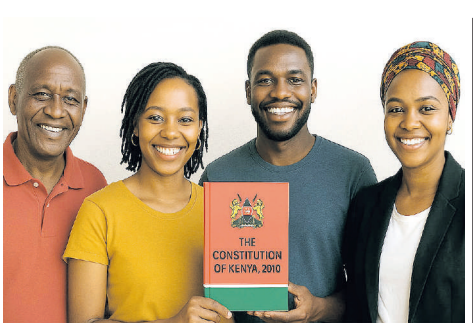JILL GHAI: Diversity, equality, inclusion and the Kenyan constitution

Diversity, equality and inclusion are values we strive for and stand up for /AI ILLUSTRATION
The Trump government tries to oblige Stockholm to trash diversity, equality and inclusion; even foreign companies might be threatened with loss of US government business.
What does this say about DEI in Kenya? It’s enshrined in the constitution and there are affirmative action programmes, though they typically usually cover ethnic and religious issues.
If the US said it cannot do business with Kenyan government bodies trying to achieve DEI, our response must be, “This part of our Constitution.” Maybe Trump can spur us to greater DEI.
“Diversity, equality and inclusion are values that we strive for and stand up for”. You might think it is a Kenyan who said this. In fact, it was a vice-mayor of Stockholm, the capital city of Sweden.
Why did he feel the need to assert this? Because of one of the more remarkable things that emerged from the Trump government. The city’s government received a letter from the US Embassy asking it to complete a form certifying that they “do not operate any programmes to promote diversity, equity and inclusion”. It added, “If you do not agree to sign this document, we would appreciate it if you could provide detailed reasons, which we will forward to our legal teams.”
It seems this is the first time such a letter has gone to a non-US government body. But even foreign companies have received letters, in similar terms, suggesting that they will be excluded from doing business with the US government if they have DEI programmes.
A list of American companies that have said they will reduce, re-orient, do away with or review DEI programmes include Boeing, Google, IBM, Goldman Sachs, Coca-Cola and Pepsi (see list at the Forbes website at https://tinyurl.com/NoDEIfirms).
What are DEI programmes? For convenience, I take the Wikipedia definition: “Organisational frameworks that seek to promote the fair treatment and full participation of all people, particularly groups that have historically been underrepresented or subject to discrimination based on identity or disability”.
We can analyse “inequality” from three perspectives. First, differences that give rise to discrimination and inequality, such as gender, age, ethnicity (including language), geography (such as part of the country, urban/rural), educational background, health status (such as a disability, HIV status) and economic status.
These starting points do not inevitably lead to disadvantage and discrimination. This depends on factors such as social prejudice, ignorance, ethnic prejudice, religious beliefs, even superstition, politics, individual attitudes (including selfishness, snobbishness and laziness), as well as administrative procedures (admissions criteria, job qualifications, etc., – not all fully rational).
And the discriminatory results – unemployment or limited employment possibilities, poor medical facilities, poor schooling, poverty, exclusion of all sorts.
And, of course, one sort of disadvantage leads to another, so poor schooling leads to lack of qualifications, rural homes often lead to poor medical facilities, which lead to disability, unemployment and to… our constitution.
Diversity, equality and inclusion may be values for Sweden; for us, they are embedded in our constitution.
We are “PROUD of our ethnic, cultural and religious diversity” (Preamble). Many provisions are about getting public institutions and bodies reflecting that diversity. They cover elected bodies (eg… Art. 90( 2 )(c)), appointed bodies like the executive (eg… Art. 130( 2 )) and commissions and independent offices (Art. 250( 4 )), as well as the national security organs (Art. 238( 2 )(d)).
Equality is a national value, and the subject of a specific Article ( 27 ), which goes further than treating everyone the same (which is not equality if the starting point of people is different).
“The State shall take legislative and other measures, including affirmative action programmes And policies designed to redress any disadvantage suffered by individuals or groups because of past discrimination.” And “inclusiveness” is also a national value (Article 10 ).
The US Constitution – the 14th Amendment – says only no State may “deny to any person within its jurisdiction the equal protection of the laws”.
The concept of needing special efforts to overcome existing and past disadvantage, of which Kenyans are so aware, receives no recognition in that constitution – and now none from that new government.
How do we implement?
We have the National Cohesion and Integration Commission, which watches issues of equality and equity, especially how far Kenyan public bodies really reflect the face of the country. But it covers only ethnic and religious issues. And it is limited to publicity, persuasion and education, with no powers to enforce any sort of fair or affirmative action.
There is a government department on affirmative action, but it is focused on gender equality.
The National Gender and Equality Commission also focuses on gender, but it does have programmes and has carried out research on other types of inequality, particularly disability-based.
In 2016 it published, with the Kenya Institute for Public Policy Research and Analysis (KIPPRA), a major study on the Status of Equality and Inclusion.
It commented: “Much has been done in terms of establishing policy and legal frameworks for mainstreaming equality and inclusion, but much less has been done in terms of operationalising the frameworks.”
More recently Ngec has sponsored the idea of Equality and Inclusion Technical Working Groups at national and county levels to support, guide and monitor measures to ensure inclusion of a range of often excluded groups.
Court cases have required the police to provide “reasonable accommodation” for officers with disability (this does not mean housing, rather facilities and arrangements so they can still work).
Various measures have improved the employment situation in public bodies. A quota system is supposed to ensure fair chances of admission to secondary school for all students.
But, “Despite the implementation of a quota admission policy, the intended purpose of ensuring equitable access to quality secondary school education by students from various socioeconomic status has not been achieved.” (Daniel Wemanya, master’s thesis on Kakamega county, Kenyatta University, 2022 ).
We cannot, I suggest, yet claim that fully-fledged DEI programmes are common in Kenya, even in the public sector. But discussions are taking place, and some companies operating here do claim to have DEI programmes.
Can the US government “philosophy” have an impact here?
If the American government tried to say it cannot do business with Kenyan government bodies trying to achieve DEI, our response must surely be, “This part of our Constitution.” We should not, we cannot, abandon our Constitution to cosy up to a government, the philosophy of which is so remote from ours and our realities.
At present, there is no clear legal requirement on the private sector. We cannot say the American companies operating here must have positive DEI programmes – although they, like anyone else, must not discriminate. It is the State, according to Article 27, that must “take legislative and other measures, including affirmative action programmes and policies designed to redress any disadvantage suffered by individuals or groups because of past discrimination.”
On the other hand, that Article is not limited to what you can call “formal equality” – treating everyone the same. For example, it says, “Equality includes the full and equal enjoyment of all rights and fundamental freedoms.”
This is not directed at government alone. To respect the right to equality, which is the duty of us all, we should all try to work towards true equality in situations where we can have some impact.
Far from being influenced by eccentric ideas in some quarters, the time has come for us to flesh out our constitutional approach.
We need an Equality Act. It may need to clarify what sorts of distinctions do not count as unconstitutional discrimination; apart from being free to choose our own intimate partners and friends, it may be necessary to clarify other situations in which not wanting to associate is not unconstitutional.
Director, Katiba Institute. The author is expressing her personal opinion









